05/17/18
K-State Current - May 17, 2018
K-State Current is a weekly news update for the Kansas Board of Regents to apprise the Regents on a few of the many successes and achievements made by K-State faculty, staff and students.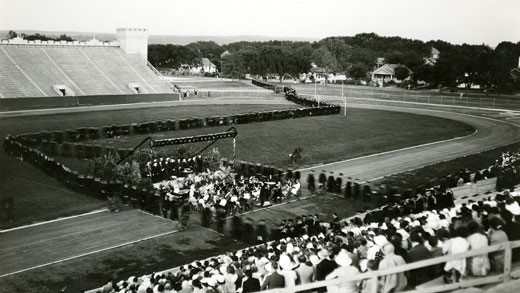
K-State News
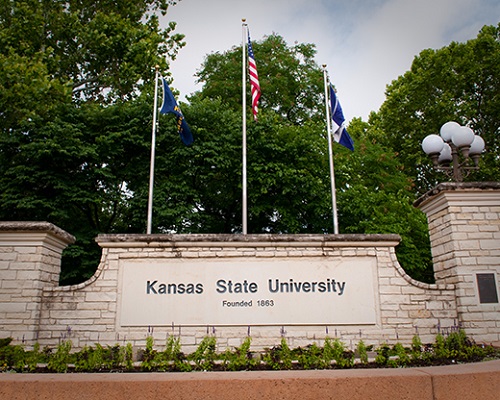
For the fourth year in a row, Kansas State University tops a national study of the best educational value in Kansas.
The study by SmartAsset determines which schools provide the best bang for the educational buck based on tuition, living costs, average scholarships and grants, starting salary upon graduation, and retention rates. In the Sunflower State, the study found Kansas State University to be the best value among the 10 schools surveyed. SmartAsset is a financial data and technology company.
"It comes as no surprise that the university in Kansas that provides the best return on investment also is the No. 1 choice of Kansas high school graduates," said Pat Bosco, Kansas State University vice president for student life and dean of students.
According to SmartAsset, Kansas State University graduates are earning the highest starting average salary among the Kansas schools at $50,000, which is up $1,700 from last year's state-leading $48,300 starting salary. That increase also dovetails with the university's latest postgraduate report, which finds that 95 percent of Kansas State University's 2016-2017 graduates were employed or continuing their education within six months of their graduation.
"Year after year, our graduates are in demand by employers and professional schools as shown by our high job placement and continuing education rates," Bosco said. "To achieve this high output is a recognition of the excellent teaching and academic culture offered by K-State, which is designed to bring out the best in our students."
Kansas State University also has the highest student retention rate in the state at 85 percent, which is 4 percentage points higher than the second-place school. Student retention is a priority and the university's high retention rate shows the success of K-State First, the university's first-year student success program. The university also offers other programs and services for student success, such as First Scholars for first-generation students, the Academic Assistance Center and the Career Center. In addition, Kansas State University students receive more than $230 million in financial aid each year.
Other Kansas schools surveyed by SmartAsset include the University of Kansas, Washburn University, Baker University, Pittsburg State University, Mid-America Nazarene University, Fort Hays State University, Wichita State University, Emporia State University and Southwestern College.
Twelve K-State Olathe-based students earn graduate degrees
A record 12 students at Kansas State University's Olathe campus are graduating with their master's or doctorate in the spring and summer academic semesters.
In addition to being the largest graduating class, it also includes the first graduates from the professional science master in applied science and technology program, which was approved in April 2016.
"It has been an honor watching so many of our graduates contribute new ideas and research to their field while they continued to work on their degree," said Janice Barrow, associate dean for academic affairs and executive education. "As bittersweet as commencement is, we are proud of our new graduates and look forward to their future successes using the knowledge and skills they learned from K-State Olathe."
Students were recognized during K-State Olathe's graduation celebration on May 9.
Graduates are as follows:
- Margie Banach, master's degree, adult learning and leadership
- Zachary Hoppenstedt, master's degree, horticulture with an emphasis in urban food systems
- Christine Laskero, master's degree, adult learning and leadership
- David Loewen, master's degree, horticulture with an emphasis in urban food systems
- Jamie Otto, master's degree, adult learning and leadership
- Eric Racki, professional science master's degree, applied science and technology
- Anna Sage, master's degree, veterinary biomedical science
- Audra Sasse, master's degree, nutrition, dietetics and sensory sciences
- Nate Scherman, professional science master's degree, applied science and technology
- Melissa Snider, master's degree, veterinary biomedical science
- Danny Unruh, doctorate, food science
- Jennifer Yelton, master's degree, adult learning and leadership
Visit olathe.k-state.edu/academics to learn more about the arranged graduate-level academic programs offered at K-State Olathe as well as the recently added bachelor's in hospitality management degree completion program.
K-State Faculty Highlights
Physicist joins major international project mapping universe's expansion
A Kansas State University physicist has been selected for a global team that will explore dark energy and its effects on expansion of the universe.
Lado Samushia, assistant professor of physics, will take part in the U.S. Department of Energy's Dark Energy Spectroscopic Instrument project, known as DESI. The project will conduct a survey of distant galaxies through the use of a 4-meter telescope at the Kitt Peak National Observatory in Arizona. Set to start in late 2019, DESI will measure the spectra of tens of millions of galaxies and quasars in the universe over the next five years. 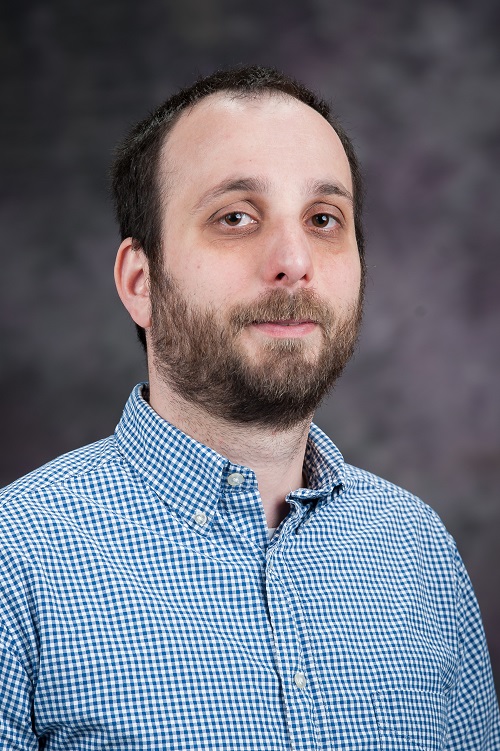
"DESI is important because it will deliver data that is more than 10 times larger than what we have today," Samushia said. "This data will allow us to see how matter is distributed in the universe and will enable us to measure properties of the universe with unprecedented precision."
Samushia's role with the project will be helping make sense of the data collected and compiling and condensing it for use in further scientific explorations. He and colleagues also will try to come up with efficient ways of analyzing the data, looking for statistical patterns in it and trying to figure out what those patterns reveal about dark energy.
"We now know that about 70 percent of the universe is made of dark energy, a mysterious substance that causes accelerated expansion of the universe," Samushia said. "We do not have a good idea of what the nature of this dark energy is. Data collected by DESI will help immensely in our quest to understand dark energy and may even provide a breakthrough that will revolutionize the whole of theoretical physics."
The DESI collaboration currently consists of about 170 members from United Kingdom, France, Spain, Mexico, Korea, China, Australia and a number of U.S. institutions, including the Lawrence Berkeley National Lab in Berkeley, California. The Department of Energy is paying for most of DESI's costs, with participating institutions contributing by building its components, helping in the development of data reduction software and by providing additional cash.
Samushia was invited to join the DESI team because of the $180,000 Energy Department grant he received for his project "Constructing Large-Scale Structure Catalogs for DESI Survey."
"I proposed a project to the Department of Energy that involved constructing galaxy catalogs from DESI data, Samushia said. "I was very fortunate and the project was funded. The DESI board decided that this work was important for the experiment and granted me — and K-State — the membership. I am really grateful to my colleagues for giving me this opportunity and am looking forward to actively participate in one of the biggest cosmology experiments of the 21st century."
Samushia calls the DESI project the most significant he has worked on. He also is part of two other space missions, but their launch dates are a few years away. They include the NASA space observatory WFIRST and the Euclid satellite missions managed by the European Space Agency.
Soumia Bardhan named recipient of 2018 Curriculum Development Grant
Soumia Bardhan, assistant professor of communication studies, has been named a recipient of the 2018 Curriculum Development Grant from the Global Religion Research Initiative. Bardhan is one of only 11 faculty members in North America to receive the $4,000 award.
The grant will support further development of Bardhan's course, Religion and Communication in the Middle East. This upper-level undergraduate elective course focuses on the relational and co-constitutive dynamics among religion, culture and communication. In the course, students will explore how religion, culture and communication shape the world in which people live; how the legacy of political religious conflict, in conjunction with international culture wars, instigate socio-cultural conflict and change; and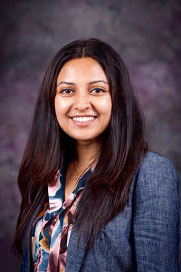 how an in-depth study of the dynamics of religion, culture and communication can improve intergroup, intercultural and international relations and conflict resolution processes, each in the context of the Middle East.
how an in-depth study of the dynamics of religion, culture and communication can improve intergroup, intercultural and international relations and conflict resolution processes, each in the context of the Middle East.
"This award is a testament to Dr. Bardhan's noteworthy teaching efforts and her desire to help students explore the role of communication in religion and culture," said Greg Paul, interim head of communication studies.
Bardhan's research focuses on the intersections of religion, politics, gender and new media, particularly the discursive practices within Islam; the rhetoric of Muslim minority groups; and the role of new media and social media in the cultural-political transformation of Arab societies in the Middle East-North Africa region. Bardhan also directs travel seminars focusing on Islam and intercultural dialogue in Spain and France.
K-State Student News
Nutrition, dietetics and sensory science master's student receives Fulbright Award
Alexander Fees, a master's degree student in nutrition, dietetics and sensory science, Manhattan, is Kansas State University's newest Fulbright U.S. Student Award recipient.
Receiving a one-year fellowship, Fees is one of more than 1,900 U.S. student or recent alumni who will conduct research, teach English or provide expertise abroad for the 2018-2019 academic year through the Fulbright U.S. Student program. Fees will travel to Budapest, Hungary, to research the cardiovascular abnormalities and deficits that occur with aging in coronary circulation, in conjunction with faculty at Semmelweis University.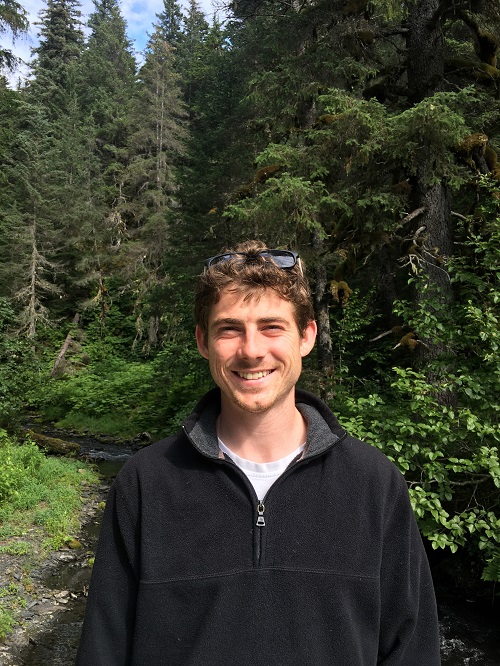
"I want to thank Dr. Timothy Musch and Dr. David Poole of the Department of Kinesiology in the College of Human Ecology for their outstanding mentorship and research training," Fees said. "I owe, in large part, the success of this Fulbright to them."
As an undergraduate, Fees co-authored five peer-reviewed manuscripts concerning peripheral oxygen transport in chronic heart failure. He is a co-author of four published abstracts in the journals of Medicine and Science in Sports and Exercise, and the Federation of American Societies for Experimental Biology. Fees received first place in Kansas State University's SPARK competition and the University Research Forum for the Biological Sciences. He also presented his research at the 2016 American College of Sports Medicine Cardiorespiratory Physiology Symposium in Boston.
Fees received the Outstanding Senior Research Award and Office of Undergraduate Research & Creative Inquiry's travel and research awards, and he was named a College of Human Ecology Student of the Month. His other achievements include the Earl G. and Henrietta Jones Darby Scholarship, Letha V. Reser and Sharon Y. Nickols Scholarship, College of Human Ecology Achievement Award Scholarship, L. Jeanne Stephenson Beck Scholarship and Telefund Scholarship.
Fees is a member of Phi Kappa Phi Honor Society, Kappa Omicron Nu Honor Society, Golden Key International Honour Society, K-State Honors Council, College of Human Ecology Council, Kansas Public Health Association, American Physiological Society and the American College of Sports Medicine. He has recently been involved with the Smoke-Free Campus Committee in implementing a policy to improve the health of the university community.
A graduate of Manhattan High School, Fees is the son of Gary and Bronwyn Fees, Manhattan.
The Fulbright Program is the flagship international educational exchange program sponsored by the U.S. government and is designed to build lasting connections between the people of the United States and the people of other countries. Students interested in future participation in the Fulbright competition should speak with Jim Hohenbary, director of the Office of Nationally Competitive Scholarships, in 215 Fairchild Hall. The campus deadline for the next application cycle is Aug. 31.
The new Student Governing Association, or SGA, leaders on the Kansas State University Polytechnic Campus have been sworn in for the 2018-2019 school year and plan to use their position to advocate for the needs of their peers.
Christian Coker, junior in professional pilot, was elected Student Governing Association president in March alongside his running mate Shanna Walker, junior in airport management and professional pilot, who is serving as vice president. The pair ran on continuing the past administration's focus of student involvement around campus as well as a commitment to helping students' voices be heard.
"This campus is our place of learning and living, where we spend much time and money, so it is important to Shanna and me that our fellow students' point of view is always recognized, listened to and considered," Coker said. "With the current dean retiring and an interim dean transitioning into the position soon, we felt concentrating on that communication would be even more essential this year."
Both Coker and Walker have been engaged with student government previously. Last term, Coker served as vice president and was a senator representing the aviation program the beginning of his sophomore year. Walker entered the Student Governing Association as an aviation senator her freshman year and then chaired Programming Board, which reports to the Student Governing Association, as a sophomore.
"When I started at Kansas State Polytechnic, I wanted to be involved in something, and joining SGA gave me the opportunity to meet other students while making a difference around campus," Walker said. "As vice president, I hope to help other students have that same fulfilling experience."
In addition to her role with the Student Governing Association, Walker is a peer mentor for Student Support Services, assisting students with various parts of college life, such as tutoring, setting up advising appointments and finding resources on campus. She is a member of the student chapter of the American Association of Airport Executives, participates in the student organization Christian Challenge, and works with new students as a uBelong mentor.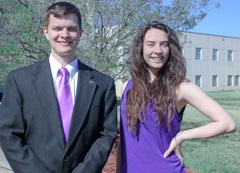
A graduate of Cair Paravel-Latin School in Topeka, Walker began pursuing aviation as a teenager with her father's love of the field her inspiration. Currently, she is working on her instrument rating and hopes to have a career as a corporate or charter pilot.
Most of Coker's involvement on campus is derived from his work as Student Governing Association vice president. He was the chair of the Fall Career Fair committee in 2017 and has attended various campus ribbon-cutting ceremonies as the organization's representative. Coker also has connected with prospective students through the admissions program Polytechnic Wildcat for a Day and is a member of a fitness club, called Polytechnic Powercats.
Coker is from Tulsa, Oklahoma, and graduated from Broken Arrow High School. He is currently working on his commercial certificate and hopes to have a career as a demo or test pilot.
Senator positions serving each of the campus's program areas — aviation, engineering technology, human development and family science, social work and technology management — are still available. Contact Coker at motox16@k-state.edu or Walker at shanna52@k-state.edu for more information about these opportunities.
Coker and Walker's term as study body president and vice president of Kansas State Polytechnic will be for one year.